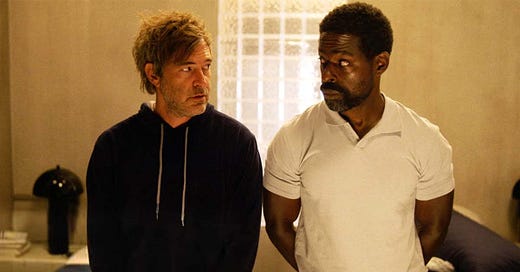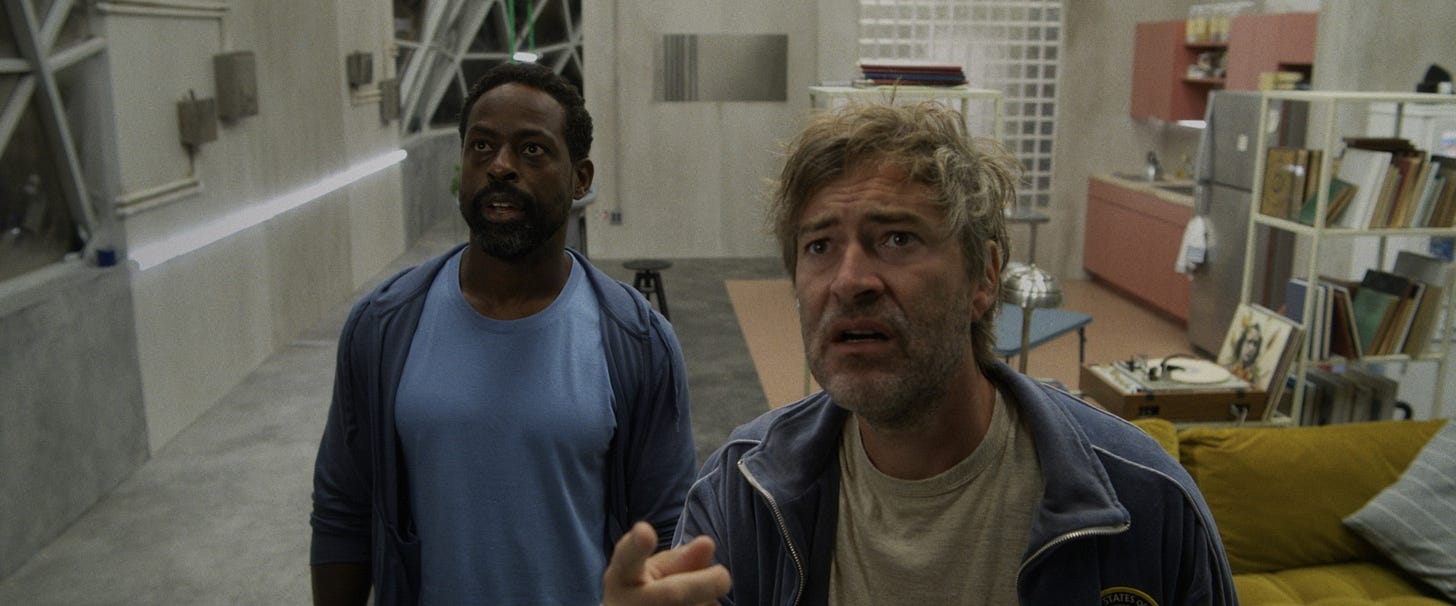Biosphere (2022)
In this wacked-out comedy, two men, the only survivors after Earth's population is wiped out, hold humanity's fate in their hands — and will have you laughing your head off
Humanity’s last shot? Billy (Mark Duplass) and Ray (Sterling K. Brown) have only each other
Biosphere (2022)
Opening July 7
I usually publish my reviews shortly before or after a movie’s release date. But I’m coming out early on Biosphere because it’s going to be strenuously gabbed about, as well as backhandedly dismissed, even before it opens.
The moment it’s described, neutrality won’t be an option.
Completed late last year, it’s only now getting a general release, and one reason may be that its script is the definition of risk-taking.
Biosphere takes off from an impish, dizzying premise. An unnamed calamity has ended all of humanity and left Earth with only two survivors.
One is Billy (Mark Duplass), who, as it happens, was president of the United States. The other is Ray (Sterling K. Brown), a childhood friend of Billy’s as well as a gifted biologist, engineer and visionary builder of futuristic dwellings.
Before the planet’s decimation, just because Billy asked him to, Ray built an enormous life-supporting geodesic dome.
With deeper foresight than he perhaps realized, Ray filled it with abundant plant and aquamarine life and equipped it with a circulating air system that, fortunately, can keep both men alive indefinitely.
Of course, they never dreamed they’d actually need this stupendous, toylike structure. But when an unknown force desolated planet Earth they dashed for the shelter.
It’s never quite clear who, including family and friends, they’ve left behind. Only their deep personal bond keeps them focused now.
The movie is both funny ha-ha and funny/scary.
Humans just trying to get along can suddenly face cataclysm, and a shared crisis can become life-threatening in the blink of an eye.
Focused and giddy. What’s disarming and comically daring about this set-up is that the protagonists, embodying what looks like humanity’s end time, are indomitably cheerful.
They laughingly divide daily tasks. Billy is to keep the place tidy, including its ample sleep and living quarters and a large kitchen.
He’s a bit slack on the job. Being U.S. president hasn’t prepared him for mundane daily chores. (Megan Fenton’s production design and Samantha Bowling’s set decoration are witty and inventive.)
Ray’s chief responsibility is making sure their sole food supply, the plant and fish life, flourishes.
Amping up the pressure is a rapidly approaching threat from the cosmos.
In the 24-hour inky black sky, through the dome’s windows they spot a menacing green light slowly moving toward them.
A green light in the darkened sky slowly makes its way toward them. What’s up with that?
Is it a final blow to humankind? Are Billy and Ray now obliged to save humanity from total extinction?
For much of the 106-minute running time, the far-out premise feels less dystopian than delirious, and Brown and Duplass expertly push bizarre dilemmas into blissful spoofing.
Until Ray and Billy are forced to Get Serious. Director Mel Eslyn’s madcap script (co-written with Duplass), coupled with her acute sensitivity to actors’ rhythms, piles absurdities on top of one another at a precise, slowly worrying, clip.
Billy and Ray battle this brain teaser with deeply hilarious and quietly touching bro camaraderie.
They’re so richly attuned you begin to realize that the movie’s actual, sneakily subversive subject is male closeness.
Two men wrangling to best and outsmart one another gradually learn to maximize their greatest strength: each other.
Eslyn’s beautifully scaled staging of action within a confined space keeps the movie bouncing, a dexterous feat for a first-time director.
And Christopher Donlon’s on-the-button editing makes the abrupt, tickly transitions pointed and seamless.
The two actors pick up the script’s tricky pretext and run with it, generous screen partners in every scene.
Duplass goes hyperactive bordering on hysterical as Billy, a former president who now governs nothing and no one, certainly not his brilliant scientist friend with the steely intellect.
Brown shows how all of Ray’s formidable expertise hasn’t prepared him to rely on another human to save — humankind.
Indeed, for all the idiocy, “humankind” is at stake here. The word encompasses -“kind”, which means we’re all basically alike, or, put another way, we’re all in this together.
So, the movie is mostly funny ha-ha but also funny/sobering.
Humans just trying to get along can suddenly face cataclysm, and a shared crisis can become life-threatening in the blink of an eye.
The prolonged joke in this loony movie refuses to die, and finally that laughter in the dark is all that gives Ray and Billy their best fighting chance.





